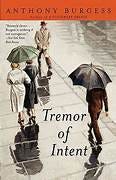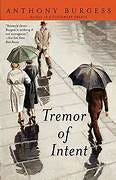'If we're going to save the world,' said Hillier, 'we shall have to use unorthodox doctrines as well as unorthodox methods. Don't you think we'd all rather see devil-worship than bland neutrality?'
At primary school, in the early ‘80s, I became involved in what, for want of a more glamourous term, we used to call 'spy clubs'. There were two such clubs, each with just one member - let's call the individuals Alfred and Guthrum - with an extra member joining one or the other occasionally. That was myself. The double agent. The Third Man.
'We know all your secrets,' Guthrum and I informed Alfred sententiously, violating the sanctuary of the cloakroom, where he sat tying his laces. His mouth formed a perfect 'O' of surprise and shame. Guiltily, I looked away. The hats, coats and scarves on their wooden pegs reminded me of Narnia and the Wardrobe. It must have been winter. After school. Some extra-curricular activity. Certainly the playground was dark and frosty when Alfred fled. He was a broken reed, but we knew he'd already be scheming revenge, which was, of course, exactly what we wanted. It meant the game would go on.
Because that's all it was. A game. There were no secrets. Nothing either the British or Soviet authorities needed to be notified of. Why did we play it then?
Denis Hillier, Burgess's protagonist in this 1965 espionage yarn, gives us a deeply metaphysical response:
'But what's it all for?' asked Clara. 'Agents and spies and counter-spies and secret weapons and being brainwashed. What are you all trying to do?'
'Have you ever wondered,' said Hillier, 'about the nature of ultimate reality? What lies beyond this shifting mass of phenomena? What lies beyond even God?’
'Nothing's beyond God,' said Alan. 'That stands to reason.'
'Beyond God,' said Hillier, 'lies the concept of God. In the concept of God lies the concept of anti-God. Ultimate reality is a dualism or a game for two players. We - people like me and my counterparts on the other side - we reflect that game. It's a pale reflection. There used to be a much brighter one, in the days when the two sides represented what we know as good and evil. That was a tougher and more interesting game ... '
Thinking back again to those school years, I recall the frequency with which we were exhorted by the great and the good to 'stand on your own two feet,'
'But what am I to do,' I recall quizzing a teacher, 'once I'm on my own two feet? Just stand here?'
These are the questions, beyond the surface ‘spy versus spy’ level, that this book plays with. Who am I? Why am I here? And now that I am here, what do I do? It is an existential novel, with a premium put on commitment and engagement. What do I stand for? How do I act out my beliefs in the world?
What matters, for Burgess, is the quest for meaning and value, especially in an age like our own which radically militates against such concepts. The alternative is to disengage, to opt out of history, to become a bland and lukewarm neutral:
'The neutrals' said Alan.' If we could get down to the real struggle we wouldn't need spies and cold wars and spheres of influence and the rest of the horrible nonsense. But the people who are engaged in these things are better than the filthy neutrals.'
'And yet everything's an imposture,' replied Hillier. 'The real war goes on in Heaven.'





The deepest level of communication
is not communication,
but communion.
It is wordless.
It is beyond words.
It is beyond speech.
It is beyond concept.
Not that we discover a new unity, but we discover an old unity.
My dear brothers and sisters, we are already one.
But we imagine we are not.
And what we have to recover is our original unity.
What we have to be, is what we are.
- Thomas Merton
> 'Beyond God,' said Hillier, 'lies the concept of God.
This seems to be back to front.
The concept (Hegel's "Begriff") is merely a handle, a grace, a morsel of daily bread to sustain us as we walk "the magic length of God".